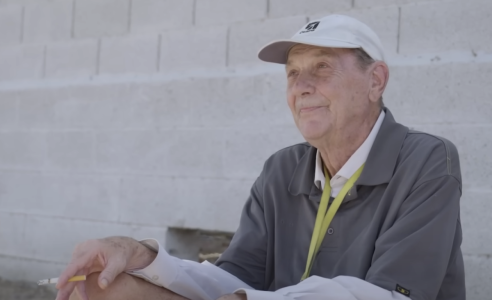The hidden retirement crisis leaving thousands of seniors without a home
By
Veronica E.
- Replies 0
For many, retirement is imagined as a time of peace, family gatherings, and long-awaited rest.
But for a growing number of older Americans, those expectations are being replaced with something far more troubling.
Rising housing costs, shrinking safety nets, and unexpected life challenges are forcing thousands of seniors into homelessness each year.
This reality is often overlooked, yet it continues to grow as the population ages and affordable housing becomes harder to find.
For countless seniors, the golden years have become a struggle for stability and survival.

Vernon Wedge spent nearly two decades working as a security camera operator at a department store in Arizona.
He lived modestly, expecting to retire with enough to get by.
But after losing his eyesight, he also lost his job and steady income.
By the time he was 69, Vernon, his son Grant, and their dog Roscoe were evicted and forced to live on the streets.
"Money ran out, we got a shopping cart and filled it with personal belongings, mostly clothes, and hit the streets," Vernon recalled.
"I spent my 70th birthday on the street."
Vernon’s story is part of a wider trend.
According to the Department of Housing and Urban Development (HUD), more than 42,000 people aged 65 and older were homeless last year.
Experts warn this figure will likely increase as rents continue to climb and retirement savings fail to keep up.
There is rarely just one cause.
For some, a health crisis or sudden job loss can spiral into financial instability.
For others, Social Security benefits fall short of covering rent and daily expenses.
Lori Cowling, age 80, found herself homeless earlier this year when her monthly Social Security check of just over $1,000 could not cover even a modest apartment in Phoenix.
Like Vernon, she became part of a growing group of older Americans struggling to maintain housing security.
Homelessness has long been associated with younger populations or those battling addiction, but the reality is shifting.
Increasingly, it is seniors—grandparents, retirees, and lifelong workers—who are finding themselves without a place to live.
Many try to manage by staying in temporary shelters, showering at public parks, or seeking help from churches.
Shelters like St. Vincent de Paul in Phoenix offer meals, medical care, and a safe place to sleep, but stays are limited, often capped at two years.
Several factors are contributing to this troubling rise:

The challenges are daunting, but solutions exist.
Advocates point to the need for more affordable housing initiatives, expanded funding for Social Security and SSI, and greater investment in senior services.
Local shelters and nonprofits also rely on donations and volunteers to provide meals, healthcare, and case management.
On an individual level, checking in on older neighbors and helping connect them to resources can make a difference.
For those approaching retirement, financial planning—even through free community services—may help prepare for unexpected challenges.
Resources for seniors facing homelessness
No one should have to spend their later years without the dignity and comfort of a safe home.
By raising awareness, supporting community programs, and advocating for stronger protections, we can help ensure that seniors like Vernon and Lori are not forgotten.
Together, we have the power to turn this hidden crisis into a call for lasting change.
Read next: What’s holding you back from enjoying your retirement savings? 9 common obstacles—and how to move past them

At The GrayVine, we believe in the strength of shared knowledge and support. If you or someone you know has experienced housing insecurity in retirement, your story can help raise awareness. Community voices matter when it comes to advocating for stronger safety nets and more compassionate solutions.
Together, we can work toward a future where no one spends their later years without a safe place to call home.
But for a growing number of older Americans, those expectations are being replaced with something far more troubling.
Rising housing costs, shrinking safety nets, and unexpected life challenges are forcing thousands of seniors into homelessness each year.
This reality is often overlooked, yet it continues to grow as the population ages and affordable housing becomes harder to find.
For countless seniors, the golden years have become a struggle for stability and survival.

Thousands of older Americans are struggling with homelessness as housing costs rise and safety nets fall short. Image Source: Pexels / Huy Phan.
A crisis hiding in plain sight
Vernon Wedge spent nearly two decades working as a security camera operator at a department store in Arizona.
He lived modestly, expecting to retire with enough to get by.
But after losing his eyesight, he also lost his job and steady income.
By the time he was 69, Vernon, his son Grant, and their dog Roscoe were evicted and forced to live on the streets.
"Money ran out, we got a shopping cart and filled it with personal belongings, mostly clothes, and hit the streets," Vernon recalled.
"I spent my 70th birthday on the street."
Vernon’s story is part of a wider trend.
According to the Department of Housing and Urban Development (HUD), more than 42,000 people aged 65 and older were homeless last year.
Experts warn this figure will likely increase as rents continue to climb and retirement savings fail to keep up.
Also read: Why retirement savings feel harder than ever—and how Americans are adapting
Why so many seniors are becoming homeless
There is rarely just one cause.
For some, a health crisis or sudden job loss can spiral into financial instability.
For others, Social Security benefits fall short of covering rent and daily expenses.
Lori Cowling, age 80, found herself homeless earlier this year when her monthly Social Security check of just over $1,000 could not cover even a modest apartment in Phoenix.
Like Vernon, she became part of a growing group of older Americans struggling to maintain housing security.
Also read: Five free or low-cost retirement perks you may be overlooking
The changing face of homelessness
Homelessness has long been associated with younger populations or those battling addiction, but the reality is shifting.
Increasingly, it is seniors—grandparents, retirees, and lifelong workers—who are finding themselves without a place to live.
Many try to manage by staying in temporary shelters, showering at public parks, or seeking help from churches.
Shelters like St. Vincent de Paul in Phoenix offer meals, medical care, and a safe place to sleep, but stays are limited, often capped at two years.
Also read: The simple mistake that wiped out a man’s entire retirement savings
Systemic challenges behind the crisis
Several factors are contributing to this troubling rise:
- Rising housing costs: Rent increases have far outpaced Social Security and fixed incomes.
- Health issues: Chronic illnesses and medical bills quickly deplete retirement savings.
- Lack of affordable housing: Waitlists for subsidized senior housing stretch for years.
- Limited family support: Many older adults lack family who can provide help or housing.
- Thin safety nets: Programs like SSI and food assistance provide some relief but often fall short of covering all basic needs.

Vernon Wedge, 69, lost his job after his eyesight failed and now faces homelessness alongside his son and dog. Image Source: YouTube / NBC News
Also read: Thinking of working in retirement? Here’s where seniors are thriving
What can be done
The challenges are daunting, but solutions exist.
Advocates point to the need for more affordable housing initiatives, expanded funding for Social Security and SSI, and greater investment in senior services.
Local shelters and nonprofits also rely on donations and volunteers to provide meals, healthcare, and case management.
On an individual level, checking in on older neighbors and helping connect them to resources can make a difference.
For those approaching retirement, financial planning—even through free community services—may help prepare for unexpected challenges.
Resources for seniors facing homelessness
- National Alliance to End Homelessness: endhomelessness.org
- Eldercare Locator: 1-800-677-1116 or eldercare.acl.gov
- Local Area Agencies on Aging: Available in most communities to connect older adults with housing, food, and healthcare resources.
No one should have to spend their later years without the dignity and comfort of a safe home.
By raising awareness, supporting community programs, and advocating for stronger protections, we can help ensure that seniors like Vernon and Lori are not forgotten.
Together, we have the power to turn this hidden crisis into a call for lasting change.
Read next: What’s holding you back from enjoying your retirement savings? 9 common obstacles—and how to move past them
Key Takeaways
- More than 42,000 Americans aged 65 and older experienced homelessness last year, with numbers expected to rise.
- Individual stories like Vernon Wedge and Lori Cowling highlight how quickly health or financial setbacks can lead to housing insecurity.
- Temporary shelters provide some relief, but strict time limits and rising rents leave many seniors vulnerable.
- Systemic issues—such as insufficient Social Security, rising medical costs, and a lack of affordable housing—are fueling the crisis.
At The GrayVine, we believe in the strength of shared knowledge and support. If you or someone you know has experienced housing insecurity in retirement, your story can help raise awareness. Community voices matter when it comes to advocating for stronger safety nets and more compassionate solutions.
Together, we can work toward a future where no one spends their later years without a safe place to call home.






